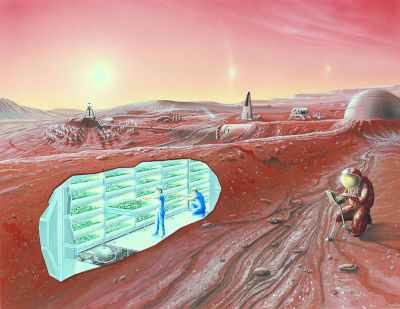
The thought of living on foreign planets has fascinated humanity since many Decades. However there is a bunch of obstacles that need to be overcome in order to make an extraterrestrial colony become reality. First of all we would have to solve the issue of constructing a spaceship that is capable of transferring humans to a foreign planet as well as back to earth. Also the surface temperature should not be to high neither should it be to low and there should be a magnetic field to protect from cosmic radiation. Furthermore the availability of water, ideally in liquid state is crucial in order to grow plants, to provide humans with drinking water and to gain an energy source. Lastly a dense atmosphere with a significant percentage of oxygen is necessary for breathing without space suits. So to what extend do the characteristics of mars correspond to our needs and how could possible issues be solved?
As a terrestrial planet mars resembles earth in some points which is obviously beneficial for a possible colony. Firstly mars is a rocky planet with a solid surface and its not too distant from sun. Secondly the length of days on mars is only 40 minutes longer than on earth and the length of the year corresponds to 1.88 years on earth. Thirdly, the red planet possesses an atmosphere and scientist found hints on the existence of fluid water. However if astronauts would land on mars after a journey of at least six months they would face several challenges. Low air pressure as well as the thin atmosphere mainly consisting of carbon dioxide would require the use of special suits. One of the biggest obstacles for permanent human life on mars is its weak magnetic field offering only little protection against cosmic radiation. On the long run this exposure would raise the cancer risk significantly. The most popular solutions to lower this exposure are shielding by water tanks, shielding by artificial magnetic fields, building an underground station or using regional magnetic fields on mars. The thought of an underground station covered by mars soil becomes even more promising since it would also offer protection against small meteorites. For as a result of the thin atmosphere asteroid impacts are much more likely to occur on mars than on earth which poses another threat to a colony.

In order to establish a self sustaining colony on mars access to water sources is crucial. Unfortunately the previously mentioned water resources of mars are located at the poles and either frozen or difficult to reach. This leaves the option of transporting hydrogen to mars which could be used to produce four times the amount of water. Probably the only sustainable source of water is water in the soil that could be accessed with heat. Energy for the mars colony could be provided by solar cells even tough they would need to be cleaned regularly from dust and the output is significantly lower compared to earth.
Furthermore there is the idea of Terra-forming which basically means slowly transforming the whole planet according to our needs. Some scientists come to the conclusion that controlled emission of carbon dioxide could heat the atmosphere sufficiently to melt the polar ice which would release even more green house gases. This would offer more protection against asteroids and increase the air pressure. As a next step humans could start planting plants which would slowly raise the percentage of oxygen in the atmosphere. However it remains controversial whether Terra-forming is realistic.
Currently the company Space X, founded by the American billionaire Elon Musk, is probably closest to actually transferring humans to mars. According to their timeline the reusable vehicle “Starship” will depart to mars in 2026 carrying up to 100 tons of cargo and passengers. Some scientists argue that this date is rather optimistic and predict the first manned mission to mars between 2040 and 2050.
sources:
https://de.wikipedia.org/wiki/Marskolonisation
https://www.spacex.com/human-spaceflight/mars/
